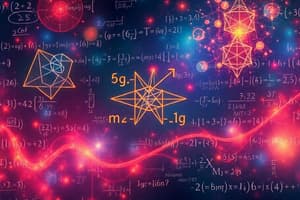Podcast
Questions and Answers
Who is credited with formalizing algebra in his book 'Al-Kitāb al-mukhtaṣar fī ḥisāb al-ğabr wa'l-muqābalah'?
Who is credited with formalizing algebra in his book 'Al-Kitāb al-mukhtaṣar fī ḥisāb al-ğabr wa'l-muqābalah'?
- Pythagoras
- Euclid
- Archimedes
- Muhammad ibn Musa al-Khwarizmi (correct)
What ancient civilization is mentioned as one of the first to use numerical operations like addition, subtraction, multiplication, division, and more?
What ancient civilization is mentioned as one of the first to use numerical operations like addition, subtraction, multiplication, division, and more?
- Mesopotamians (correct)
- Mayans
- Romans
- Vikings
What does the word 'algebra' originate from?
What does the word 'algebra' originate from?
- Arabic word 'al-jabr' (correct)
- Latin word 'algebrae'
- Sanskrit word 'matha'
- Greek word 'arithmos'
Which branch of algebra studies the manipulation of symbols according to certain rules?
Which branch of algebra studies the manipulation of symbols according to certain rules?
When was algebra developed from the work of early civilizations like Babylonia and Greece?
When was algebra developed from the work of early civilizations like Babylonia and Greece?
What type of algebra examines how symbols relate to each other within specific structures?
What type of algebra examines how symbols relate to each other within specific structures?
What are some common applications of algebra in everyday life?
What are some common applications of algebra in everyday life?
Which of the following is a key concept in algebra?
Which of the following is a key concept in algebra?
How do operators contribute to algebraic expressions?
How do operators contribute to algebraic expressions?
What do inequalities express in algebra?
What do inequalities express in algebra?
Why are variables important in algebraic equations?
Why are variables important in algebraic equations?
What is not a method used for solving quadratic equations?
What is not a method used for solving quadratic equations?
Flashcards are hidden until you start studying
Study Notes
Algebra
Algebra is a branch of mathematics that deals with generalizations, structures, relations, quantities, change, and variables. It was developed from the work of early civilizations such as Babylonia around 2000 BC and Greece as early as 600 BC. The word 'algebra' comes from the Arabic word 'al-jabr', which means reunion of broken parts. Today, it forms one part of a broad spectrum of mathematical disciplines, often used in conjunction with geometry, arithmetic, calculus, and statistics.
Foundations
The history of algebra can be traced back to ancient civilizations like Mesopotamians and Egypt, who started using numerical operations like addition, subtraction, multiplication, division, raising to powers, and extracting roots as early as 3000 BC. However, algebra was formalized by Muhammad ibn Musa al-Khwarizmi in his book "Al-Kitāb al-mukhtaṣar fī ḥisāb al-ğabr wa'l-muqābalah" ("The Compendious Book on Calculation by Completion and Balancing"), published around AD 830. This book introduced the concepts of algebra through a collection of problems involving equations and unknowns.
Algebra has two main branches called symbolic algebra and abstract algebra. Symbolic algebra studies the manipulation of symbols according to certain rules while abstract algebra examines how these symbols relate to each other within specific structures. In symbolic algebra, operations are performed on expressions composed of constants, variables, and known functions. For example, solving a quadratic equation involves applying various techniques such as factoring, completing the square, or using the quadratic formula.
Applications
Algebra is widely applied in various fields including science, engineering, technology, economics, finance, medicine, and social sciences. Some common applications of algebra in everyday life include:
- Solving Problems: Algebra helps us solve problems by using formulas and equations to find missing information.
- Understanding Relationships: Algebra teaches us how different situations relate to each other, making it easier for us to understand cause and effect relationships between events.
- Modeling: By creating models based on real-world scenarios, we can analyze and predict outcomes using algebraic methods.
Key Concepts
Some key concepts in algebra include:
- Constants: These are numbers that do not change throughout the course of an expression or equation.
- Variables: These are letters or symbols that represent unknown values in an equation.
- Operators: These include basic arithmetic operators (+, -, *, /) as well as more complex ones like parentheses, exponents, and roots.
- Equations: Statements that express the equality of two mathematical expressions; they typically involve solving for a variable.
- Inequalities: Statements that compare two mathematical expressions without necessarily implying their equality.
In conclusion, algebra is an essential tool for understanding quantitative relationships among variables in real-world situations. Its application spans across diverse domains, making it a cornerstone of modern scientific thought.
Studying That Suits You
Use AI to generate personalized quizzes and flashcards to suit your learning preferences.




